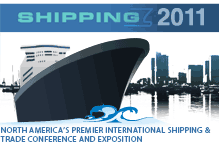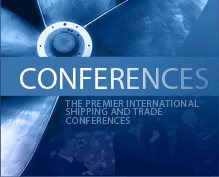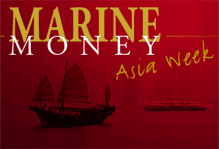
Low Interest in High Yield
Despite the fact that shipping issues continue to offer investors significant trading and yield opportunities, investor interest in the sector has waned in recent months.
One reason for the lack of interest may be the fact that many distressed players jumped in too early, got skinned and are steering clear of the sector. Many of the most logical buyers of these bonds have already bought and are kicking and scratching just to get out whole.
At the same time, the shrinking universe of existing deals, and lack of promise for future deals and underwriting fees, have caused many analysts to pick up coverage on other, more active sectors. There is also the fact that Chase, AMA, Poseidon and Deutsche seem to have locked up the workout business between them. As noted elsewhere in this issue, Tom Mazarakis became the latest shipping analyst to leave the sector when he joined Goldman Sachs in London.
Continue Reading
Financial (and other) Costs of Raising Money
When John Blankley spoke before the Connecticut Maritime Association in March, one of his many words of wisdom to fellow shipowners was not to borrow from a bank if they could possibly help it. A nice thought indeed, but a luxury that most shipowners cannot afford.
Continue Reading
Athenian Sea Carriers Limited: Take the bull by the horns
by Kevin Oates
Although shipping remains an industry not especially favoured by the capital markets, there is no doubt that increased industry standards from charterers, class societies, peer pressure and Intertanko, to name but a few, are forcing some companies to focus on structural change and quality matters and even accept the inevitable requirement of financial transparency. And all else being equal, these companies now fit the niche of capital market acceptability.
Athenian Sea Carriers
Athenian is one of the Greek companies that has made this change. The principal of Athenian, Minos Kyriakou, has also followed another trend of top Greek owners in the last decade – that of diversification. Indeed in the last ten years in Greece Minos Kyriakou has received much attention for his media activities. During this period his ANTENNA radio and television stations have become domestic leaders, have tapped US and European bond and equity markets, and have spread their wings to provide live TV services to the vast Greek populations in Australia, South Africa and America. What is perhaps not so well known is that the initial capital for the media projects came from a long and successful career in shipping.
Continue Reading
SUEZMAX: A Supporting Player of the Past Takes Center Stage
By Jerry Lichtblau, Director of Research & Analysis, Mallory, Jones, Lynch, Flynn & Associates
Many of us have been taught that the price had we are charged for any goods or services is a function of supply, demand and alternative goods and services. The Suezmax sector has entered the new millennium with a reduction in demand. It has faced increased cannibalization from VLCC’s in its core region for demand, yet the price has risen by at least 20% for cargoes loading in the regions of predominant Suezmax demand.
Rising prices in the face of a reduction in demand and increased use of alternative goods can lead one to conclude that there is an inadequate supply. In this case, not enough Suezmax ships. Why the sudden change in supply? Simplistically, the impact of OPA; but there is rarely one answer to a question like this. There are usually a myriad of issues.
This briefing will attempt to support the preceding premise and evaluate prospects going forward while reviewing the risk factors that are generally ignored when bull markets roars into bulk shipping. We will analyze and review the supply and demand dynamics of the suezmax sector, assess the near term outlook for the sector as well as competition from other segments. Finally, we will evaluate the earnings required for adequate returns in an effort to highlight the importance of cost basis of this or any asset.
Continue Reading
Freshly Minted – April 20, 2000
HIGH YIELD
Bond market has been quiet with most actively traded bonds being Navigator Gas whose restructuring is imminent.
TBS
Sometimes a game is over before it is actually played. In the case of TBS, the way the original deal was structured made restructuring it particularly challenging. Here’s what we mean: under the restructuring terms disclosed last week, TBS shareholders seem to have negotiated a very favorable deal for themselves. The company was able to swap $110 million in notes for $50 million in new notes and some preferred and common shares while maintaining affiliate relationships through which to generate additional fees. So why did TBS get such a sweetheart deal when other bondholders have been able to extract maximum value from shipping issuers? One reason is because TBS’s bond deal included only the vessel owning subsidiaries and not the company’s network of liner companies, including TBS Pacific Liner Ltd., TBS Latin America Liner Ltd. and TBS North America Liner Ltd. Since the enterprise value of the TBS relies less on the ships and more on the liner companies and their contracts, which were not included in the bond deal, simply seizing the assets was not an attractive alternative, or threat. As a result, bondholders had somewhat limited options, they could go through the costly process of arresting the ships and selling them without contracts in a relatively thin sale and purchase market, or they could work with management. Neither scenario would yield maximum value and bondholders seem to have chosen the later, perhaps because it involves less risk and less additional capital. At the end of the day, no two high yield shipping restructurings are the same, but each will be recorded in the play book for investors next time around.
DAN STEN OLSSON AND THE IMPORTANCE OF CONTEXT Continue Reading
Freshly Minted – April 14, 2000
THE SECOND ANNUAL SHIP FINANCE FORUM: NORWAY
BREAKING NEWS “LIVE” FROM OSLO!
Thursday’s very successful event hosted by Marine Money International and it’s corporate sponsors DnB Shipping, Haight Gardner Holland & Knight, Wiersholm, Mellbye & Bech and last Oslo Stock Exchange attracted over a 120 ship finance executives from all major shipping companies and banks in Scandinavia. Tidbits from the speakers tell us that there are again more positive expectations for shipping companies as well as the B2B boom / explosion hitting our industry. However Ragnhild Wiborgr, portfolio manager of the only pure shipping investment fund, Odin Forvaltning urged, for the second year in a row, shipping companies to improve their corporate transparency in order to increase private investor’s appetite for shipping equities. This is especially important today, for the shipping companies who are listed on the Oslo Stock Exchange who, together with oil service companies and cruise companies represent 22% of the market cap, and who must compete closely with the “new business” companies who have 20% of the market cap and increasing fast. On Wiborg’s top list in corporate transparency, I.M. Skaugen and Frontline scored highest points, while Fred Olsen was slaughtered on corporate transparency.
Morits Skaugen , CEO of chemical company I.M. Skaugen told the audience how his company is very successfully improving their corporate transparency through the use of Internet and B2B commerce. It is clear that they will be a good example for other shipping companies. We hope that more shipping companies will follow in the footsteps of Skaugen in improving their corporate transparency to again attract the interest of shipping’s familiar equity investors. Keep in mind that the companies also need average returns to be more than 6-9 %. Continue Reading
Freshly Minted – April 6, 2000
HIGH YIELD
Despite the fact that shipping issues continue to offer investors significant trading opportunities, interest in the sector seems to have waned in recent months. One reason for the lack of interest may be the fact that many distressed players jumped in too early and got skinned. Many of the most logical buyers of these bonds have already bought and are kicking and scratching just to get out whole. Patience Pays!
GOLDEN OCEAN
As we reported last week, as part of Frontline’s commitment to Golden Ocean of $5 million in DIP finance, the company has been granted 15 days from April 4th to perform exclusive due diligence on the Golden Ocean and examine a possible transaction. Having an “exclusive” period is typical for US industrial companies in bankruptcy, though the lock-up is typically 30 days. Here’s how it works: after the 15 day period expires, Frontline can choose to submit a plan of reorganization to Golden Ocean and its creditor committee. The proposal would outline what consideration creditors would receive (Frontline shares perhaps) if they adopt Frontline’s plan. If adopted, Golden Ocean will then bring the proposal to the US bankruptcy judge for review. At the same time, Frontline would submit a funding agreement contingent on a favorable ruling by the court. Mr. Fredriksen does not have the exclusive right to submit a plan of reorganization. Therefore, once the 15 day period expires, Messrs. Restis, Kollakis, Goymer, or anyone else, could submit an alternative plan for consideration. It is, after all, a free country. In our view, we would not be surprised to see Frontline submit a plan that is acceptable to Golden and its creditors. While Mr. Fredriksen is often criticized in the trade press, deep knowledge and serious analysis of his previous acquisitions indicates that is willing to pay fair value and that he honors contracts and obligations to the letter.
MILLENIUM SEACARRIERS
Perhaps following in the footsteps of Bill Livanos who resigned from Millenium to join MaritimeDirect, fellow Millenium director Manny Kiprios has established a dot com venture of his own, OSI Investments. In other Millenium news Wayland Investments is playing hardball with Millenium for an allegedly shorting bondholders on their coupon payments. We provide the original Exhibit D at the bottom of this issue of FM for your review. It should be noted that if Wayland is an original holder (not clear from the letter), they have the additional remedy of suing “on the indenture.” Continue Reading
What Shipping Should Learn from Stelmar
by Kevin Oates
Stelmar Shipping Ltd was established in September 1992 by Stelios Hadjioannou (“Stelios”). The company operates modern tanker tonnage; has dabbled in newbuildings; has a full corporate structure; is staffed with personnel carefully chosen from the market for their skills and experience; has a strong preference for fixed term employment, thus guaranteeing income; and has an unbroken run of profitable financial performance since the company was set up. As we go to press, Stelmar is in the process of raising about $55 million on the Cyprus Stock Exchange. Not a bad C.V. for a young company in a challenging market.
Stelios, however, has other things on his mind too. His other businesses are booming. EasyJet, a low cost, no frills airline established in 1995 to compete with the big boys in intra-European travel, is going great guns. Indeed a public flotation is likely end 2000, probably in London. EasyShop, a network of cyber cafes offering internet capacity, is expanding rapidly and proving to be very successful. More than 50 cafes are planned over the next two years all over continental Europe. EasyRent, a low cost car rental service was launched only recently. And other hi-tech internet based projects are planned like EasyBank and easy.Com.
Continue Reading
Ship valuations: a primer for the puzzled
by Sydney P. Levine, President Shipping Intelligence, Inc., New York
The current controversy about ship valuation is a classic case of unrealistic expectations. Those who are most upset about the state of ship valuation want it to be something that it is not, never has been and never can be. Here are a few questions and answers that may clear up the confusion.
What is a ship valuation, anyway?
A ship valuation is an estimate of the market value of a specified ship at a specified time. It is, in the valuer’s opinion, the price that would be agreed to by
Willing and independent buyer and seller in an “arms length” transaction.
How is a valuation done? Continue Reading
Glossary of ADR Terms
American Depositary Debenture (ADD)
A depositary receipt that represents debt rather than equity. Developed in 1993.
American Depositary Receipt (ADR)
A certificate traded in U.S. securities markets representing ownership of common shares in a non-U.S. corporation. ADRs are quoted and traded in U.S. dollars. Developed in 1927.
Broker
Makes an active market in an issuer’s ADRs, executes retail trades, disseminates research reports on the issuer and maintains and services investor accounts.
Continue Reading







